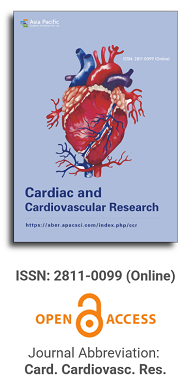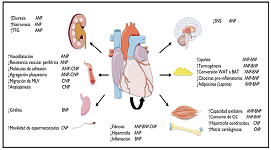
Asia Pacific Academy of Science Pte. Ltd. (APACSCI) specializes in international journal publishing. APACSCI adopts the open access publishing model and provides an important communication bridge for academic groups whose interest fields include engineering, technology, medicine, computer, mathematics, agriculture and forestry, and environment.

Effect of clopidogrel gene on platelet reactivity and major cardiovascular events in patients with acute coronary syndrome
Vol 4, Issue 1, 2023
Download PDF
Abstract
Objective: To investigate the effect of clopidogrel gene polymorphism on platelet reactivity and major cardiovascular events in patients with acute coronary syndrome (ACS). Methods: 149 patients with ACS who underwent percutaneous coronary intervention (PCI) in Zhongshan Hospital Affiliated to Fudan University from January to December 2019 were included. All patients were tested for clopidogrel related genotypes after admission. Aspirin (100 mg/d) and clopidogrel (75 mg/d) were taken regularly after operation, and the inhibition rate of platelet aggregation (IPA) induced by adenosine diphosphate (ADP) was detected. According to the IPA results, the patients were divided into two groups: high platelet reactivity (HPR) group after clopidogrel treatment (IPA < 30%) and low platelet reactivity (LPR) group after clopidogrel treatment (IPA > 30%). Results: According to IPA results, there were 23 cases (15.44%) in HRP group and 126 cases (84.56%) in LRP group. The IPA induced by arachidonic acid (AA) in HRP group was significantly lower than that in LPR group (p < 005). There were significant differences in CYP2C19*2, CYP2C19*3, ABCB1 AND PON1Q192R loss of function (LOF) alleles between the two groups (p < 005). Multivariate logistic regression analysis showed that CYP2C19*2DF allele was associated with mace after PCI (or = 3112, 95%СI 1048~9241, P = 0.041). Conclusion: Clopidogrel gene polymorphism has certain effect on platelet reactivity in patients with ACS. CYP2C19*2 gene mutation is related to mace after PCI.
Keywords
References
- Chinese Medical Association, Journal of Chinese Medical Association, General Medicine Branch of Chinese Medical Association, et al. Primary diagnosis and treatment guidelines for non ST segment elevation acute coronary syndrome (2019) (Chinese). Chinese Journal of general practitioners. 2021; 20(1): 6-13.
- Collet JP, Thiele H, Barbato E, et al. 2020 ESC Guidelines for the management of acute coronary syndromes in patients presenting without persistent ST-segment elevation. European Heart Journal. 2020; 42(14): 1289-1367. doi: 10.1093/eurheartj/ehaa575
- Nakamura M, Kimura K, Kimura T, et al. JCS 2020 Guideline Focused Update on Antithrombotic Therapy in Patients with Coronary Artery Disease. Circulation Journal. 2020; 84(5): 831-865. doi: 10.1253/circj.cj-19-1109
- Levine GN, Bates ER, Bittl JA, et al. 2016 ACC/AHA guideline focused update on duration of dual antiplatelet therapy in patients with coronary artery disease:a report of the American college of cardiology/American heart association task force on clinical practice guidelines: an update of the 2011 ACCF/AHA/SCAI guideline for percutaneous coronary intervention, 2011 ACCF/AHA guideline for coronary artery bypass graft surgery, 2012 ACC/AHA/ACP/AATS/PCNA/SCAI/STS guideline forthe diagnosis and management of patients with stable ischemic heart disease, 2013 ACCF/ AHA guideline for the management of ST-elevation myocardial infarction, 2014 AHA/ACC guideline for the management of patients with non-ST-elevation acute coronary syndromes, and 2014 ACC/AHA guideline on perioperative cardiovascular evaluation and management of patients undergoing noncardiac surgery. Circulation. 2016; 134(10):123-155. doi: 10.1161/cir.0000000000000452
- Brown SA, Pereira N. Pharmacogenomic Impact of CYP2C19 Variation on Clopidogrel Therapy in Precision Cardiovascular Medicine. Journal of Personalized Medicine. 2018; 8(1): 8. doi: 10.3390/jpm8010008
- Yoon HY, Lee N, Seong J, et al. Efficacy and safety of clopidogrel versus prasugrel and ticagrelor for coronary artery disease treatment in patients with CYP2C19 LoF alleles: a systemic review and meta‐analysis. British Journal of Clinical Pharmacology. 2020; 86(8): 1489-1498. doi: 10.1111/bcp.14317
- Xu J, Wang A, Wangqin R, et al. Efficacy of clopidogrel for stroke depends on CYP2C19 genotype and risk profile. Annals of Neurology. 2019; 86(3): 419-426. doi: 10.1002/ana.25535
- Máchal J, Hlinomaz O. Efficacy of P2Y12 Receptor Blockers After Myocardial Infarction and Genetic Variability of their Metabolic Pathways. Current Vascular Pharmacology. 2018; 17(1): 35-40. doi: 10.2174/1570161116666180206110657
- Pan Y, Chen W, Wang Y, et al. Association Between ABCB1 Polymorphisms and Outcomes of Clopidogrel Treatment in Patients with Minor Stroke or Transient Ischemic Attack. JAMA Neurology. 2019; 76(5): 552. doi: 10.1001/jamaneurol.2018.4775
- Zhang Z, Chen M, Zhang L, et al. The impact of cytochrome 450 and Paraoxonase polymorphisms on clopidogrel resistance and major adverse cardiac events in coronary heart disease patients after percutaneous coronary intervention. BMC Pharmacology and Toxicology. 2020; 21(1). doi: 10.1186/s40360-019-0378-7
- Ogawa H, Isshiki T, Kimura T, et al. Effects of CYP2C19 allelic variants on inhibition of platelet aggregation and major adverse cardiovascular events in Japanese patients with acute coronary syndrome: The PRASFIT-ACS study. Journal of Cardiology. 2016; 68(1): 29-36. doi: 10.1016/j.jjcc.2015.07.019
- Bliden KP, DiChiara J, Tantry US, et al. Increased Risk in Patients with High Platelet Aggregation Receiving Chronic Clopidogrel Therapy Undergoing Percutaneous Coronary Intervention. Journal of the American College of Cardiology. 2007; 49(6): 657-666. doi: 10.1016/j.jacc.2006.10.050
- Su Q, Li J, Tang Z, et al. Association of CYP2C19 Polymorphism with Clopidogrel Resistance in Patients with Acute Coronary Syndrome in China. Medical Science Monitor. 2019; 25: 7138-7148. doi: 10.12659/msm.915971
- Zou X, Deng X li, Wang Y meng, et al. Genetic polymorphisms of high platelet reactivity in Chinese patients with coronary heart disease under clopidogrel therapy. International Journal of Clinical Pharmacy. 2020; 42(1): 158-166. doi: 10.1007/s11096-019-00953-w
- Xi Z, Fang F, Wang J, et al. CYP2C19 genotype and adverse cardiovascular outcomes after stent implantation in clopidogrel-treated Asian populations: A systematic review and meta-analysis. Platelets. 2017; 30(2): 229-240. doi: 10.1080/09537104.2017.1413178
- Lu W, Zhou Y, Liu X, et al. Effect of PON1 (rs662) gene polymorphism on platelet hyperreactivity in patients undergoing coronary intervention. Chinese Journal of hospital pharmacy. 2017; 37(14): 1397-1400.
- Nagalla S, Sarode R. Role of Platelet Transfusion in the Reversal of Anti-Platelet Therapy. Transfusion Medicine Reviews. 2019; 33(2): 92-97. doi: 10.1016/j.tmrv.2019.01.002
- Guo P, Chen X, Wang X, et al. Research Progress on antiplatelet resistance mechanism and clinical treatment of aspirin and clopidogrel. Chinese Journal of clinical neuroscience. 2019; 27(3): 321-328.
- Sun H, Qu Q, Chen ZF, et al. Impact of CYP2C19 Variants on Clinical Efficacy of Clopidogrel and 1-Year Clinical Outcomes in Coronary Heart Patients Undergoing Percutaneous Coronary Intervention. Frontiers in Pharmacology. 2016; 7. doi: 10.3389/fphar.2016.00453
Supporting Agencies
Copyright (c) 2023 Yanli Li, Xiaoye Li, Can Chen, Wen Pan, Xiaoyu Li, Qianzhou Lv

This work is licensed under a Creative Commons Attribution 4.0 International License.

This site is licensed under a Creative Commons Attribution 4.0 International License (CC BY 4.0).

Prof. Prakash Deedwania
University of California,
San Francisco, United States




